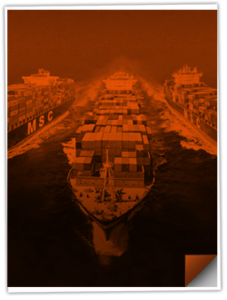Featured Headlines:
CBP Issues Core Four Framework
General License for Russian Banned Products
Mexico and Canada in Trading Places
CBP Issues Core Four Framework
- US Customs and Border Protection (CBP) posted a best practice framework to provide the importing community general guidance on (4) four core areas in which the trade should target its due diligence—Compliance, Social Responsibility, Traceability and Remediation.
- CBP encourages stakeholders in the trade community to closely examine their supply chains using the 2022 Prep Audit Partnership Responsible Trade Framework to ensure goods imported into the US meet all statutory requirements.
- Click here to view the official guidance issued by CBP on March 11th.
General License for Russian Banned Products
- CBP is now requiring importers of Russian seafood, spirits, or non-industrial diamonds “to provide purchase orders and/or executed contracts and/or any other documentation showing when the order and/or contract went into effect.”
- Although the goods were banned from the US by President Biden’s Executive Order (EO) on March 11, purchases of the goods made under contract prior to the ban can be fulfilled through March 25, 2022 (with proper documentation).
- Click here to view CSMS #51289159.
- Click here to view the general license issued by the Office of Foreign Assets Control (OFAC).
Domestic Pit Stop Back Drop
- As part of the recently passed $1.2 trillion infrastructure bill, the Biden Administration has authorized a full 4,000 projects—including the repair of 1,500 bridges— for 2022.
- While there has been a recent volume shift from intermodal rail in favor of over-the-road, current trucking fuel surcharges may well reverse that trend; this potential is most probable for heavyweight cargo.
- In related news, JB Hunt and BNSF have recently expanded their partnership by purchasing new assets and acquiring more properties. To date, JB Hunt has grown their container fleet by 40%, while BNSF has acquired land in the key gateways of Southern California and Chicago.
- Oakland, Chicago, and Charleston are suffering from debilitating congestion caused by a combination of too many empty containers headed back to Asia, long dwell times for imports, and staffing shortages.
- When congestion doesn’t create chaos, a severe lack of chassis is often the next barrier to normal operations. Unfortunately, Chicago, Jacksonville, Miami, Houston, Dallas, and Philadelphia have all reported crisis-level shortages of chassis.
Mexico and Canada in Trading Places
- US total trade with Mexico rose 17% from December to January— reaching $56.9 billion; Mexico is now in second place in the total value of goods traded with the US.
- Despite being negatively affected by border protests and strikes, Canadian trade was still a robust $56.8 billion in January.
- After dropping to 2nd place in 2019, China continues to be America’s largest global trading partner during the pandemic era; the value of that trade grew another 14% in January, reaching a lofty $59.2 billion.
The Global Shipping Grab Bag
- The US and Russia are the world’s two largest exporters of arms. Over the last 4 years, the value of US exports in arms was more than double Russia’s military exports.
- Here’s the beef— the value of US beef exports topped $1 billion in January— a 57% year-on-year increase! Interestingly, the volume of beef exports was up just 13%.
- Air France has severely limited air cargo bookings through Paris in the wake of cargo handlers’ unrest, work slow-downs, and a potential strike.
- Similarly, truckers in Spain and Italy are protesting high fuel prices and inflation, which has only worsened with sanctions against Russia. Spanish truckers began picketing on March 13th, and their Italian counterparts have scheduled actions for March 19th.
- Non-Russian aircraft owners have until March 28th to repossess their aircraft from Russian operators due to sanctions. Close to 800 jets are leased by Russian companies from non-Russian owners; Russia has countered by offering a registration process within Russian borders—which basically amounts to stealing the aircraft.
Airfreight’s Capacity Reality
- After a modest increase of 2.7% for industry cargo ton kilometers (CTKs) in January year-on-year, the air cargo industry is facing significant capacity headwinds in March.
- The war in Ukraine has sidelined Russian and Ukrainian cargo airlines, and restricted airspace is negatively affecting industry efficiencies across the board.
- While people think of Omicron as diminishing demand (which is true for passenger flights), the virus reduces air cargo capacity by limiting belly space on passenger flights.
- When counting Asia-Europe and inter-Europe air cargo trade, the disruption of air traffic in Europe affects nearly 25% of global CTKs.
- Adding to the overall disruption, jet fuel has risen considerably; it is over 30% more expensive today than at the end of 2021.
This Flippin' Ocean Shippin'
- This year, ocean bunker surcharges may rise monthly, versus the typical quarterly cycles, as fuel costs have reportedly increased by 33% in 2022 alone. Many ocean carriers will add “emergency bunker” surcharges.
- The UAE is encouraging all other oil exporting nations to increase production to help make up for the loss of Russian fuel supply; however, industry insiders are skeptical that this will alleviate the crisis significantly.
- Each week, approximately 10,000 containers travel across Russia from Asia to Europe. This route is more expensive than ocean and caters to higher-value commodities. Should this rail link be affected by the war, ocean capacity shortages will worsen, and rates will surely spike. Higher value merchandise importers will likely outbid today’s ocean shippers.
- Shipping from Shanghai and Shenzhen has been greatly affected by COVID lockdowns, quarantines, and testing. While the ports currently remain open and functioning, the main delays come at border crossings for truckers, who must prove vaccination status and be tested. Additionally, the overall supply of labor is a growing concern as positive tests emerge or as workers await test results.
- Almost exactly one year after the Ever Given put global logistics on the national news in the Suez Canal, the Ever Forward has gathered national attention for running aground in the Chesapeake Bay. While the vessel remains stuck in the bay, there have not been any notable delays to international maritime traffic to date.



